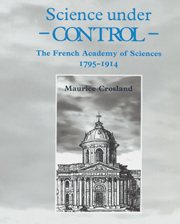Book contents
- Frontmatter
- Contents
- List of tables and figures
- Preface
- List of abbreviations
- INTRODUCTION
- 1 SCIENCE IN FRANCE
- 2 THE STRUCTURE OF THE ACADEMY
- 3 THE FUNCTIONING OF THE ACADEMY: SOME POSSIBLE ROLES
- 4 SCIENCE DIVIDED: THE SECTIONS
- 5 THE ACADEMICIANS
- 6 ELECTIONS: ‘GREEN FEVER’
- 7 REGISTRATION, JUDGEMENT AND REWARD
- 8 THE PRINTED WORD
- 9 AN ACADEMY UNDER GOVERNMENT CONTROL
- 10 ‘OUTSIDERS’: THE SCIENTIFIC FRINGE AND THE PUBLIC
- 11 THE INTERNATIONAL DIMENSION
- 12 THE CONTROL OF THE ACADEMY AND OF SCIENCE
- Name index
- Subject index
3 - THE FUNCTIONING OF THE ACADEMY: SOME POSSIBLE ROLES
Published online by Cambridge University Press: 09 October 2009
- Frontmatter
- Contents
- List of tables and figures
- Preface
- List of abbreviations
- INTRODUCTION
- 1 SCIENCE IN FRANCE
- 2 THE STRUCTURE OF THE ACADEMY
- 3 THE FUNCTIONING OF THE ACADEMY: SOME POSSIBLE ROLES
- 4 SCIENCE DIVIDED: THE SECTIONS
- 5 THE ACADEMICIANS
- 6 ELECTIONS: ‘GREEN FEVER’
- 7 REGISTRATION, JUDGEMENT AND REWARD
- 8 THE PRINTED WORD
- 9 AN ACADEMY UNDER GOVERNMENT CONTROL
- 10 ‘OUTSIDERS’: THE SCIENTIFIC FRINGE AND THE PUBLIC
- 11 THE INTERNATIONAL DIMENSION
- 12 THE CONTROL OF THE ACADEMY AND OF SCIENCE
- Name index
- Subject index
Summary
A crowd of young people come regularly on Mondays to hear memoirs which are read at the Academy; it is a means of keeping in touch with science.
(Journal des Débats, 19 September 1832.)At the [Royal] Academy [of Sciences] one can see many people in a short time
(Letter from Jean Trembley-Colladon, Paris, 28 November 1786.)The Academy has among its members judges, who know how to examine [scientific work] prudently and conscientiously; they are able to reach a decision, to give their approval or to express reservations. Guardian of scientific traditions, …the Academy appears like a superior tribunal.
(Armand Gautier, C.R., 153 (1911), 1274.)The many roles of the Academy
A good scientific institution fulfils a number of roles. In the first place its very existence should encourage or even provoke the production of new knowledge. Secondly, it should provide some facilities for the production of that knowledge, possibly by giving access to a laboratory or by loaning scientific equipment or by giving grants, although we should beware of too high (and essentially twentieth century) expectations in these areas. Thirdly, it should receive the knowledge produced. This reception of knowledge is possibly the most fundamental aspect of a scientific society. The presentation to members of a well-organised piece of research at one of its regular meetings is surely at the heart of any scientific society. If there is discussion and even criticism, so much the better. But the existence of meetings, at which papers are presented, constitutes the minimum functioning of a society.
- Type
- Chapter
- Information
- Science under ControlThe French Academy of Sciences 1795–1914, pp. 91 - 123Publisher: Cambridge University PressPrint publication year: 1992



